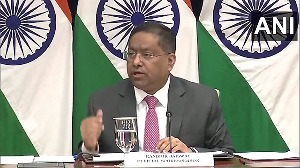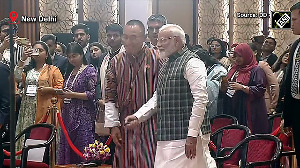In 1996, Indrajit Gupta of the CPI told the prime minister-designate that he wanted to be considered for the office of Union home minister. Deve Gowda tried to dissuade him, pointing out that the office had lost much of its lustre in the Narasimha Rao years, with vital departments such as personnel reporting to the prime minister's office. "You will have nothing better to do than to look after Centre-state relations!"
"Well then," the veteran Communist responded, "I shall try to do something for the federal structure. There has been too much centralisation in India."
Eight years later, decentralisation -- both economic and political -- seems to be the flavour of the day. But in an ironical twist, it is Comrade Gupta's marching partners on the Left who find themselves on the wrong side of the fence. And this is going to lead to some increasingly uncomfortable moments for the United Progressive Alliance.
For instance, how will the Congress reconcile the views of the Left Front with those of the Telangana Rashtra Samiti? The latter was created with the exclusive purpose of carving out the separate state of Telangana out of Andhra Pradesh. The Left is opposed to this, an attitude that became a problem during the drafting of the Common Minimum Programme. (The Congress is carefully neutral, the BJP is mildly in favour, and the Telugu Desam is totally opposed.)
Now it is the turn of Shibu Soren to start asking uncomfortable questions.
The new Union minister for coal and mines has suggested that the headquarters of Coal India Limited be moved from Kolkata to Ranchi. I am sure the idea springs from the fact that Soren is leader of the Jharkhand Mukti Morcha and that Ranchi happens to be the capital of Jharkhand. But the idea has some merit irrespective of the politics which inspired it.
Jharkhand was created because its people were tired of being ruled and exploited by outsiders. The Chhota Nagpur belt has been renowned for its mineral resources going back at least to the nineteenth century. But the wealth never seemed to find its way into the pockets of the people living there; it was always being used for the benefit of Patna and Kolkata. The rise of Laloo Prasad Yadav proved to be one burden too many even for the long-suffering Jharkhandis, convincing them that the only relief was a complete separation from Bihar.
But that still left the problem of economic emancipation from Kolkata. Making that city the headquarters of Coal India was never anything more than an echo of the colonial era. I suppose it made a certain amount of sense back in the days when there was no city in the Chhota Nagpur belt that had any decent communication facilities -- which, of course, goes a long way to prove the case that the area was being exploited for others' gains -- but that excuse holds no water today.
In fact, Kolkata has had a poor record over the past five decades of encouraging economic development in other urban areas. Take a look at West Bengal itself and you would be hard put to name any other major industrial or commercial centre outside the state capital and its hinterland. (Compare that to states such as, say, Tamil Nadu or Maharashtra, where it is possible to think of putting up factories well away from Chennai or Mumbai.)
Predictably, Shibu Soren's proposal has drawn flak in West Bengal. Both the Left Front and Mamata Banerjee's Trinamool Congress have come together to resist any attempt to move Coal Bhavan to Ranchi. Ideology and economic common sense matter little when the interests of the state are concerned.
Actually, I suspect it is as much a bureaucratic response as it is an emotional one. The creaking and antiquated structure which is India's babudom is urban-oriented to a fault. And when I say 'urban' I refer to the major metropolitan cities, not even relatively small towns like Ranchi. But there is no small hypocrisy involved when the Left Front tries to justify its opposition to Shibu Soren on the grounds of protecting 'workers' rights.' Shouldn't the 'party of the proletariat' place the interests of the poor tribals working in the collieries above the perks of the pen-pushers in Kolkata?
Shibu Soren has called the Left Front's bluff. Will the Communists live up to their own calls for decentralisation, or will they expose themselves as just another set of regional politicians lacking a truly national perspective?






 © 2025
© 2025